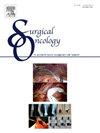Trend shift from autologous to implant-based breast reconstruction
IF 2.4
4区 医学
Q3 ONCOLOGY
引用次数: 0
Abstract
Background
Breast cancer is the most common type of cancer in women and advances in treatment have shifted the focus towards improving quality of life. Breast reconstruction plays a crucial role in preserving body image for patients undergoing mastectomy. However, significant variations exist in breast reconstruction choices across different countries. Understanding national trends can help optimize patient-centered care.
Methods
Using data from quality reports, we analyzed breast reconstruction trends in Germany from 2012 to 2021. The study examined overall reconstruction rates, the distribution of reconstruction methods (implant-based vs. autologous), and differences between surgical departments.
Results
Breast reconstruction rates in Germany have steadily increased, with up to 38 % of mastectomy patients undergoing reconstruction. The number of implant-based reconstructions rose significantly by nearly 70 % during this period. Most reconstructions were performed in gynecology departments, where the highest increase in implant-based procedures was observed.
Conclusion
The reasons for the shift towards implant-based reconstruction are speculative. The increase in contralateral prophylactic mastectomies, the lack of collaboration with plastic surgery departments and the complexity of autologous breast reconstruction could all be plausible explanations for this observation. Further analysis and critical evaluation of current trends are essential to ensure an individualized, patient-centered approach to breast reconstruction surgery.
趋势从自体乳房重建转向以植入物为基础的乳房重建
乳腺癌是女性中最常见的癌症类型,治疗的进步已经将重点转向提高生活质量。乳房重建对乳房切除术患者保持身体形象起着至关重要的作用。然而,不同国家的乳房再造选择存在显著差异。了解国家趋势有助于优化以患者为中心的护理。方法使用来自质量报告的数据,分析2012年至2021年德国乳房重建趋势。该研究检查了总体重建率,重建方法的分布(基于植入物的与自体的),以及外科科室之间的差异。结果乳房重建率在德国稳步上升,高达38%的乳房切除术患者接受重建。在此期间,基于种植体的重建数量显著增加了近70%。大多数重建是在妇科进行的,在那里观察到植入式手术的最高增幅。结论以种植体为基础重建的原因是推测性的。对侧预防性乳房切除术的增加,与整形外科部门合作的缺乏以及自体乳房重建的复杂性都可能是对这一观察结果的合理解释。进一步的分析和评估当前的趋势是必要的,以确保个体化,以患者为中心的方法乳房重建手术。
本文章由计算机程序翻译,如有差异,请以英文原文为准。
求助全文
约1分钟内获得全文
求助全文
来源期刊

Surgical Oncology-Oxford
医学-外科
CiteScore
4.50
自引率
0.00%
发文量
169
审稿时长
38 days
期刊介绍:
Surgical Oncology is a peer reviewed journal publishing review articles that contribute to the advancement of knowledge in surgical oncology and related fields of interest. Articles represent a spectrum of current technology in oncology research as well as those concerning clinical trials, surgical technique, methods of investigation and patient evaluation. Surgical Oncology publishes comprehensive Reviews that examine individual topics in considerable detail, in addition to editorials and commentaries which focus on selected papers. The journal also publishes special issues which explore topics of interest to surgical oncologists in great detail - outlining recent advancements and providing readers with the most up to date information.
 求助内容:
求助内容: 应助结果提醒方式:
应助结果提醒方式:


